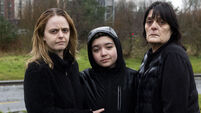The man with a few scores to settle on Sunday
The Dubliner is managing director of a company called Haveco, which is contracted by Croke Park to develop all commercial aspects of the stadium.
“That includes advertising signage, rotational signage at pitchside, as well as installation and operation of the two big screens in the stadium.”















